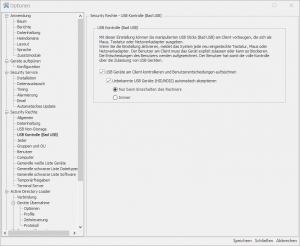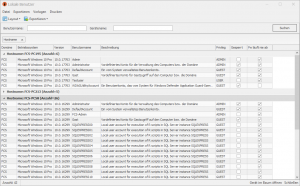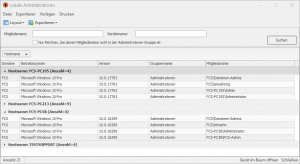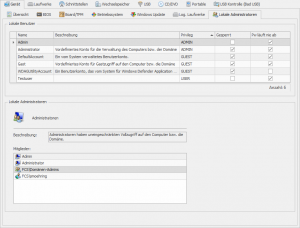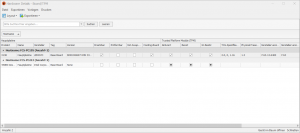Security Desk 7.2.1
Version 7.2.1 offers new functions in the area of manipulated USB sticks (Bad USB) in order to react flexibly to newly recognized USB devices. Furthermore, the system now reads out the local users and local administrators set up on the clients. And Security.Desk recognizes whether a Trusted Platform Module (TPM) chip is present in the client computer and then scans the manufacturer, specification and versions of the chip.
Since Microsoft is preparing to switch to LDAPS in the Active Directory in autumn 2020, version 7.2.1 already gives you the option of switching access to the Active Directory to encrypted connections (LDAPS).

The following new features are waiting for you:
Advanced Bad USB control
Respond flexibly to newly recognized USB devices
With a new parameter in the options, you can now also specify whether newly recognized USB devices should be automatically accepted on the client when the "Bad USB" check is switched on, optionally
- only after restarting the computer
- Immunodeficiencies.
Security.Desk ensures that the newly detected USB devices continue to be logged and centrally reported.
The new parameter makes sense in variant (1), for example, if defective USB keyboards on switched-off PCs often have to be replaced with new keyboards during operation.
Local users and administrators
Reading out the local users and local administrators set up on the clients
The local users including privileges and the members of the local administrator group are read out from each client, imported, displayed in the manager for each client and summarized in reports.
This gives administrative users of Security.Desk valuable information to control and consolidate the setup of local users and administrators on the clients.
Trusted Platform Module (TPM)
Detect if TPM chip is present and scan the manufacturer, specification and version of the chip
The Trusted Platform Module (TPM) is a chip on the motherboard that adds basic security features to the computer. Security.Desk detects whether a TPM chip is present and then scans the manufacturer, specification and version of the chip.
- TPM data is displayed on each device and in the motherboard report.
- The report also shows if no TPM chip is implemented.
Encrypted LDAP connections
Microsoft is planning to switch to LDAPS in Active Directory with an update in autumn 2020. After this Microsoft update, unencrypted LDAP connections should no longer be possible. Security.Desk is prepared for this and already offers a setting with which you can switch to encrypted LDAP connections. If LDAPS is activated in Security.Desk, the central manager and the security services on the clients access the Active Directory exclusively via SSL.
______
We wish you maximum security with Security.Desk 7.2.1!
Your FCS team
————————————————————————————————————————————————— ——————————————————————————
Are you already an FCS customer and have a Security.Desk support contract?
>> Then you can download the new version for free in our Download Area .
You don't have a support contract and would like to purchase the new version or have questions?
>> Our Sales team will be happy to advise you!

